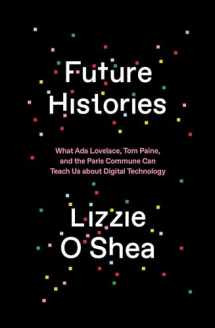
Future Histories: What Ada Lovelace, Tom Paine, and the Paris Commune Can Teach Us About Digital Technology
ISBN-13:
9781788734301
ISBN-10:
1788734300
Edition:
Illustrated
Author:
Lizzie OShea
Publication date:
2019
Publisher:
Verso
Format:
Hardcover
336 pages
Category:
Computer Science
,
Ada
,
Programming Languages
,
Evolution
,
History of Technology
,
Technology
,
Cultural
,
Anthropology
FREE US shipping
Book details
ISBN-13:
9781788734301
ISBN-10:
1788734300
Edition:
Illustrated
Author:
Lizzie OShea
Publication date:
2019
Publisher:
Verso
Format:
Hardcover
336 pages
Category:
Computer Science
,
Ada
,
Programming Languages
,
Evolution
,
History of Technology
,
Technology
,
Cultural
,
Anthropology
Summary
Future Histories: What Ada Lovelace, Tom Paine, and the Paris Commune Can Teach Us About Digital Technology (ISBN-13: 9781788734301 and ISBN-10: 1788734300), written by authors
Lizzie OShea, was published by Verso in 2019.
With an overall rating of 4.3 stars, it's a notable title among other
Computer Science
(Ada, Programming Languages, Evolution, History of Technology, Technology, Cultural, Anthropology) books. You can easily purchase or rent Future Histories: What Ada Lovelace, Tom Paine, and the Paris Commune Can Teach Us About Digital Technology (Hardcover) from BooksRun,
along with many other new and used
Computer Science
books
and textbooks.
And, if you're looking to sell your copy, our current buyback offer is $0.46.
Description
A highly engaging tour through progressive history in the service of emancipating our digital tomorrow.
When we talk about technology we always talk about tomorrow and the future -- which makes it hard to figure out how to even get there. In Future Histories, public interest lawyer and digital specialist Lizzie O'Shea argues that we need to stop looking forward and start looking backwards. Weaving together histories of computing and progressive social movements with modern theories of the mind, society, and self, O'Shea constructs a "usable past" that can help us determine our digital future.
What, she asks, can the Paris Commune tell us about earlier experiments in sharing resources--like the Internet--in common? How can Frantz Fanon's theories of anti colonial self-determination help us build digital world in which everyone can participate equally? Can debates over equal digital access be helped by American revolutionary Tom Paine's theories of democratic, economic redistribution? What can indigenous land struggles teach us about stewarding our digital climate? And, how is Elon Musk not a future visionary but a steampunk throwback to Victorian-era technological utopians?
In engaging, sparkling prose, O'Shea shows us how very human our understanding of technology is, and how when we draw on the resources of the past, we can see the potential for struggle, for liberation, for art and poetry in our technological present. Future Histories is for all of us--makers, coders, hacktivists, Facebook-users, self-styled Luddites--who find ourselves in a brave new world.
When we talk about technology we always talk about tomorrow and the future -- which makes it hard to figure out how to even get there. In Future Histories, public interest lawyer and digital specialist Lizzie O'Shea argues that we need to stop looking forward and start looking backwards. Weaving together histories of computing and progressive social movements with modern theories of the mind, society, and self, O'Shea constructs a "usable past" that can help us determine our digital future.
What, she asks, can the Paris Commune tell us about earlier experiments in sharing resources--like the Internet--in common? How can Frantz Fanon's theories of anti colonial self-determination help us build digital world in which everyone can participate equally? Can debates over equal digital access be helped by American revolutionary Tom Paine's theories of democratic, economic redistribution? What can indigenous land struggles teach us about stewarding our digital climate? And, how is Elon Musk not a future visionary but a steampunk throwback to Victorian-era technological utopians?
In engaging, sparkling prose, O'Shea shows us how very human our understanding of technology is, and how when we draw on the resources of the past, we can see the potential for struggle, for liberation, for art and poetry in our technological present. Future Histories is for all of us--makers, coders, hacktivists, Facebook-users, self-styled Luddites--who find ourselves in a brave new world.


We would LOVE it if you could help us and other readers by reviewing the book
Book review

Congratulations! We have received your book review.
{user}
{createdAt}
by {truncated_author}


